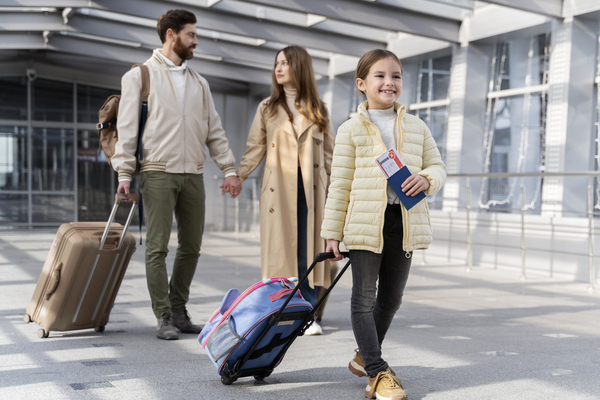5 Unforgettable Cultural Celebrations to Experience Globally
5 Lessons Learned from Traveling with Family

They are enjoyable experiences full of challenges, laughter, and opportunities for growth as individuals family outings are more than just leisure activities. You explore new things about yourself and your loved ones along the journey. A situation like this imparts significant knowledge that goes beyond the realm of travel. It fosters deeper bonds and makes lasting memories.
Patience in Transit: The Real Ticket to Smooth Travels
Taking the family on a trip needs patience. From children to grandparents, it can make things worse, the unique wants and worries of every family member. Stress is increased by airport accidents such as forgotten boarding permits, lost passports, and fidgety children. By making mistakes, you discover that anger does not usually assist anyone. Being patient assists the group in healing, adjusting, and progressing. You embrace that at times things may not go as expected.
It can be annoying to deal with early site closures, delayed dinners, and hotel check-ins. Staying composed is vital; your response matters. Children pick up on their parents' behavior, so maintaining composure during a crisis can be beneficial. Patience is vital when making decisions. It is easy to begin arguments because there are a lot of differing views on what should be done next. By attentive and patient listening, better negotiations are assisted. Furthermore, family members who spend a lot of time together when traveling may occasionally annoy each other. Tension rises as individuals’ personalities clash. Problems can be avoided later by exercising patience now.
Traveling eventually expresses that exercising patience does not entail suppressing your anger. Put perspective and kindness ahead of anger. Practice this thinking each day to strengthen it. Touring increases enjoyment also to making the trip go more smoothly. It increases awareness, acceptance, and life readiness. Also, being fun, family travel assists in fostering emotional fortitude for the future.
Different Paths, One Journey: Embracing Travel Styles
When you travel with family, you experience different preferences for the trip. Some prefer an early morning with good planning, some prefer a relaxed morning. While some plan visits to museums, others prefer going out spontaneously. Trying to make everyone travel the same way usually leads to frustration and fatigue. A good lesson is that embracing these differences, instead of fighting against them, makes everyone's life better.
It begins with the realization that needing different things does not make you difficult—it makes you human. Your sister might want to explore local markets while your dad looks for war history tours. Both ideas are good, and we can incorporate them into the plan if we're creative and willing to adapt. Dividing up during the day and meeting up again for meals or evening activities gives people a chance to pursue interests and bond. Various travel modes enrich the entire experience of the journey. Your family's diverse interests allow you to experience the city through food, culture, and fun activities differently. It also makes people value things more.
Though you don't like old ruins, seeing your sibling's excitement about history can make the trip worthwhile. Traveling together makes us understand each other. When you respect and consider other people's travel, you make your relationships better and avoid problems. You also show younger travelers how important it is to understand and compromise. Successful family travel involves sharing experiences, respecting people's space, and creating memories as a group.
Talk It Out: Why Communication Is Your Best Carry-On
Good communication is generally the secret to a successful family holiday. Misunderstandings, concealed thoughts, and imprecise plans can make a pleasant travel plan stressful. While traveling with varied companions, we need clear communication. Talk about likes, dislikes, and expectations well in advance of planning. Let's talk about preferences such as activities, expenses, and the purpose of travel before we leave, so that there will be no disputes.
When on the trip, we should converse with each other frequently and understandably. Provide a clear meeting schedule, such as "10 a.m. at the hotel entrance, to prevent any mix-ups later. When the family members go in different directions, group texting comes in handy. Make one person in charge of organizing things, such as reservations or driving on public transportation, to prevent errors. First and foremost, communication must be empathetic. Travel tires you out. People get upset. Regardless of whether they are frustrated, starving, or tired, let other people express their emotions without judgment.
When individuals can express their emotions, the environment is friendlier and more inviting. If one must skip an activity to sleep or rest, that is fine. It is important to communicate when things fail. Through misplaced bags, cancelled flights, or inclement weather, your itinerary can be foiled. Even with varying perspectives, open communication, active listening, and collaborative problem-solving foster mutual understanding and trust. Emotions, not activities alone, are the source of vacation memories. On journeys, good communication boosts positive emotions and strengthens family ties.
Savor the Small Moments: Memories That Matter Most
It is easy to judge a trip's quality based on how many activities or locations you visit. Traveling with your family teaches you that the most memorable experiences come from the most unusual situations. Instead of focusing on sightseeing, family travel is about enjoying shared experiences. Rather than breathtaking scenery, memorable experiences arise from everyday occurrences like embarrassing or thought-provoking talks. Setting time as a priority fosters appreciation for more than just duties.
Missing a train, going on an unexpected expedition, or people-watching on a park seat creates relationships. Kids benefit greatly from this method of thinking. The "ideal" trip is often something parents feel compelled to plan using a checklist. However, children need fun, enjoyment, and attention, not a hectic routine. Their favorite part of the trip could end up being bedtime stories or playing in the hotel pool. Memory preservation is another topic covered in this session. Not every moment needs to be photographed or shared online. Sometimes, putting your camera away and savoring the sounds, laughing, and atmosphere of the moment is the best way to be present.
These are often the most precious moments, even when you cannot hold them. When it comes to travel, putting emotions over tasks shifts the emphasis from accomplishments to meaningful connections. Every family member can take their time, think things out, and enjoy spending time with you. Even though you can forget things, you will still be able to remember kindness and shared emotions in unfamiliar situations.
Gratitude on the Go: The Secret to Stronger Bonds
Traveling with my family taught me to appreciate not just places and experiences, but also each other. It breaks routines and reveals familial support, like mom's snacks, sibling calming the kids, and dad's travel planning. These actions, which cannot be seen at home, stand out when you're out and about. Expressing gratitude while traveling, with a simple "thank you" or a note, enhances the experience and demonstrates mutual respect.
It shows gratitude for hard work, patience, and help, even when things are difficult. Being thankful helps reduce stress. Focusing on positives and supportive individuals amid tiredness, stress, or upset can positively impact your mood. It also changes how the group feels. When one person shows gratitude, others notice and do the same, which makes everyone feel better. Thinking back on the trip usually makes this feeling stronger. When you think back, the bad times feel less important, while the happy and helpful moments stand out more. Being thankful helps reduce frustration and makes annoying things feel less serious, turning them into funny memories.
Remember when we were lost in that alley for an hour? Now it's a shared laugh. Over time, going on trips with family brings you closer together, and feeling thankful makes those connections stronger. It helps people respect each other more, grow emotionally, and have even better trips in the future. Pictures and keepsakes can fade, but the lasting feeling of love, support, and appreciation through shared thankfulness remains forever.
Conclusion
Family travels bring challenges, but these moments, including disagreements and joys, offer valuable life lessons. Experiencing patience, diversity, better communication, small joys, and gratitude enhances relationships significantly.
These lessons help you become better, not just as a traveler, but also as a family member. They help people understand others, adapt to changes, and be thankful in ways that daily activities usually do not. When packing with your family, remember: the best souvenirs are the memories and moments that stay in your heart forever.








